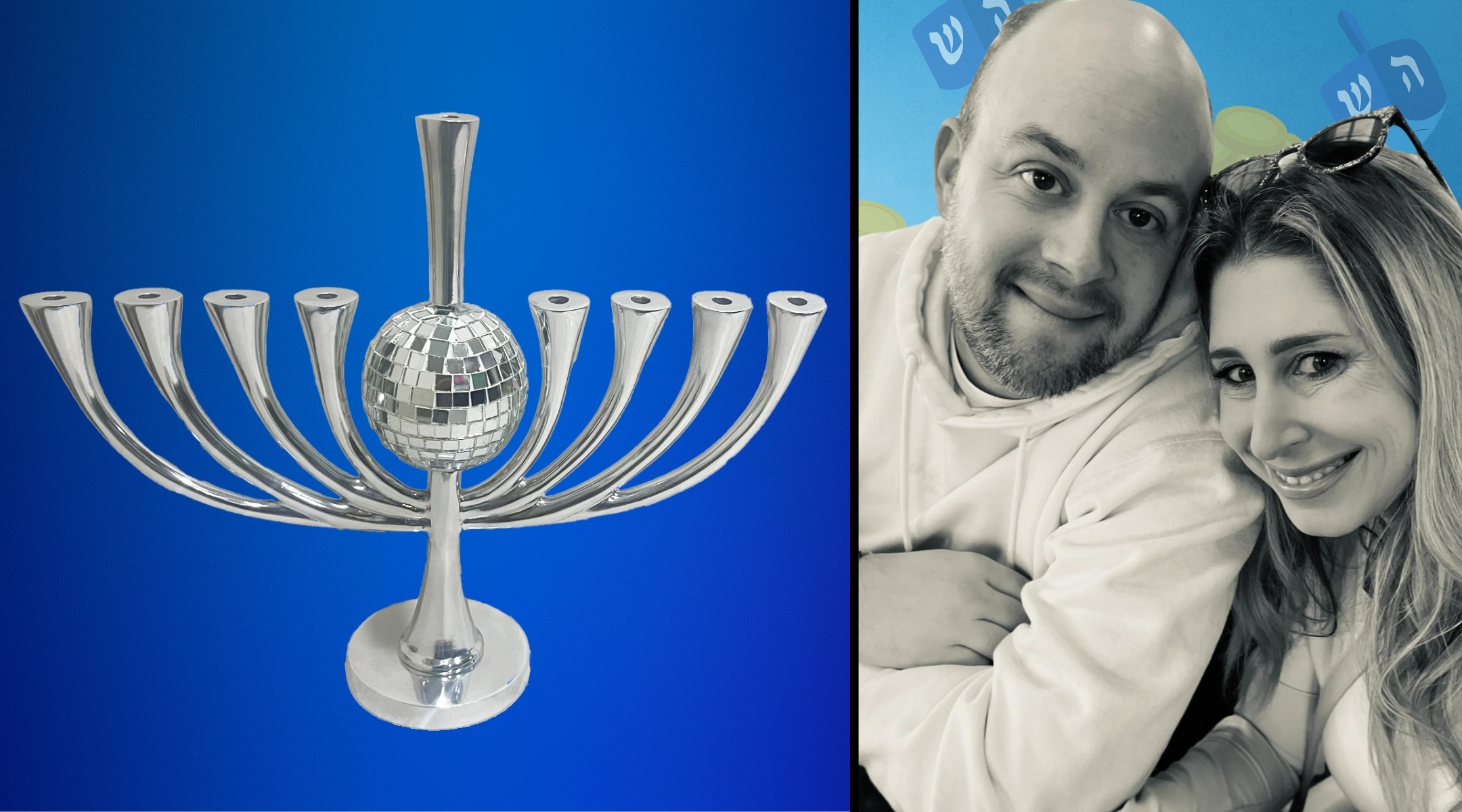In 2013, there was the “Menurkey,” a turkey-shaped menorah, for the highly unusual overlap of Thanksgiving and Hanukkah.
Now, 11 years later, a new holiday-mashup menorah is making its appearance. The Happy Jew Year hanukkiah features a spinning disco ball to mark the rare overlap between Hanukkah and New Year’s.
The menorah is the brainchild of Justin and Michelle Esgar, a New Jersey couple who have made a habit of throwing schticky Hanukkah celebrations complete with holiday staples like jelly doughnuts and latkes, tailored to an annual theme.
“Back to the Hanukkah” riffed on the movie “Back to the Future.” “Alo-Hanukkah” featured deep-fried King’s Hawaiian rolls. “My Big Fat Greek Hanukkah” took things back to the nation whose ancient forebears are traditionally depicted as the Hanukkah story’s antagonist. For “Japan-ukkah,” the Esgars created a make-your-own ramen station and Japanese sweet potato latkes. Their local sushi place arranged the rolls in the shape of a menorah.
Now, they’re trying to bring their festive spirit to the masses from their home base in Jersey City.
“When we realized that Hanukkah this year was going to be over New Year’s, I was like, ‘There’s something there we can do,’” Justin Esgar said. “So then we came up with the idea of ‘Happy Jew Year,’ and then this menorah concept where it’s representative of the New Year’s Eve ball drop from New York City.”
Hanukkah merchandise offerings have exploded in recent years, as corporations have realized the size of the marketplace created by an eight-day celebration occurring during the winter holiday season in a society where more and more families include people of multiple faiths. The idea of “Chrismukkah” — another meeting of two holidays that is also occurring this year — is a mainstay of popular hibernal discourse. But new products for calendar quirks such as the New Year’s overlap during an unusually late Hanukkah have often been the province of cottage creators who can devote themselves to a single item.
New Year’s is usually not a prime time for Judaica mashups, according to Rabbi Yael Buechler, a creator and self-appointed watchdog of mass-market Jewish products who scours big-box stores’ Hanukkah offerings.
“New Years is a time when more families are away or just returning from vacation. The grownups might have plans, but they are not as synced with kid-based experiences,” she wrote in an email. “I would have loved to see some sparkly NYE/Hanukkah headbands. Maybe they’ll surprise us with a crystal dreidel atop Times Square!”
The Esgars’ menorah is nickel-plated and made by hand. It’s priced at $54 — three times $18, a number that signifies life in Jewish tradition.
Happy Jew Year wasn’t the Esgars’ first idea. They initially considered marking the occasion with sparkler candles — but learned that Hanukkah candles have to burn for at least 30 minutes to be considered kosher.
“Nobody wants a sparkler in their house going off for a half hour,” Esgar said. “That’s a fire hazard.”
Then their thoughts turned to Asher Weintraub, the 10-year-old who invented and marketed the 2013 Thanksgiving menorah. “It was a kid who made the menurkey,” Esgar said. “We were kind of thinking about that when we were coming up with this idea.”
While the Menurkey was effectively a single-use object for most buyers — Thanksgivukkah will not happen again until 2070, nearly six decades after the last occurrence — the Happy Jew Year menorah will soon be relevant again. Hanukkah will overlap with New Year’s Eve again in 2027, 2035 and 2043.
JTA has documented Jewish history in real-time for over a century. Keep our journalism strong by joining us in supporting independent, award-winning reporting.





